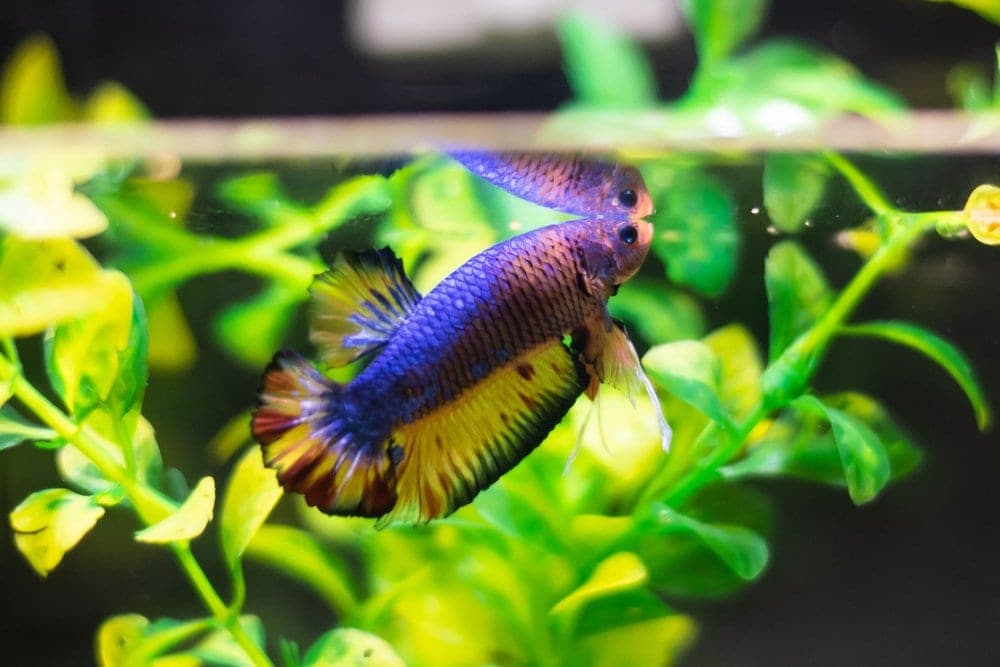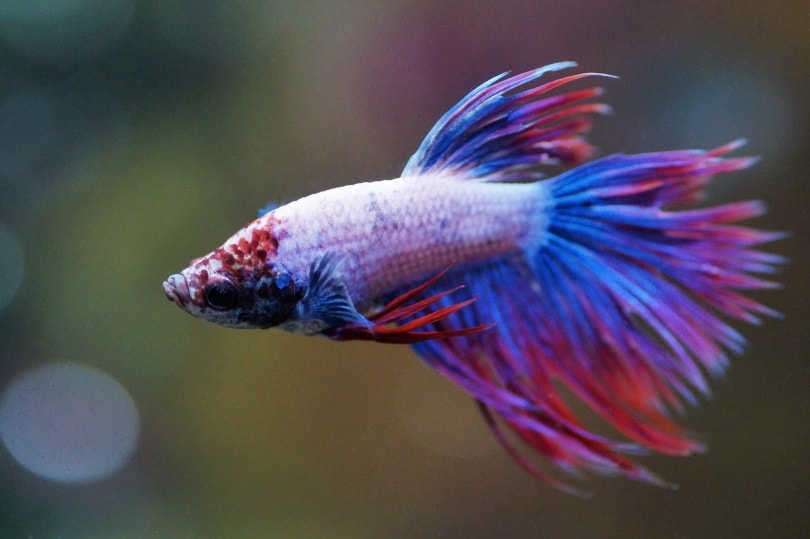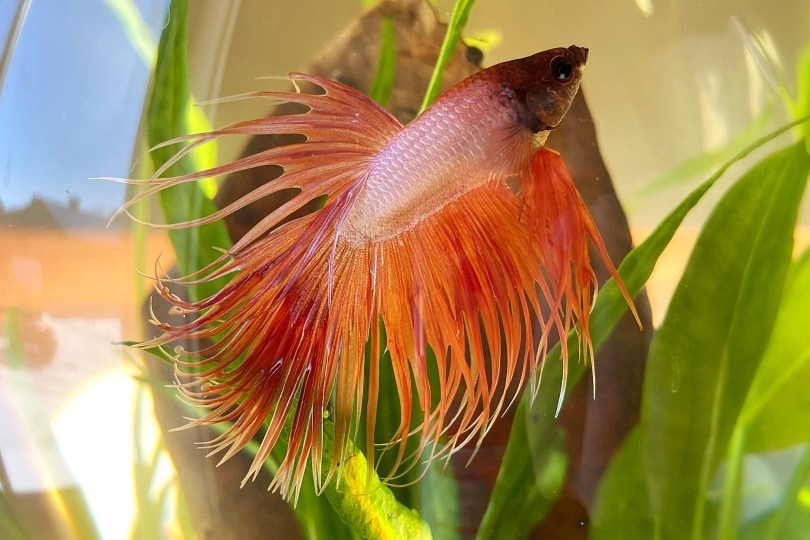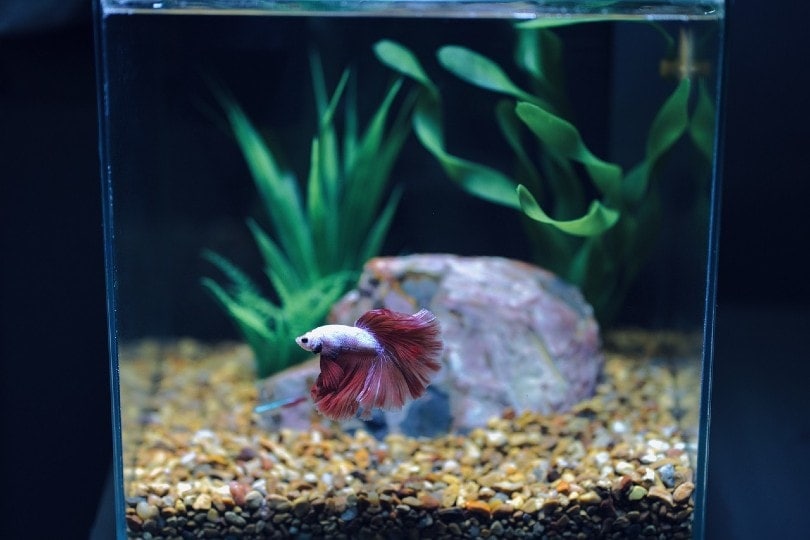Betta Fish Glass Surfing: 8 Vet-Approved Tips For a Fix

Updated on
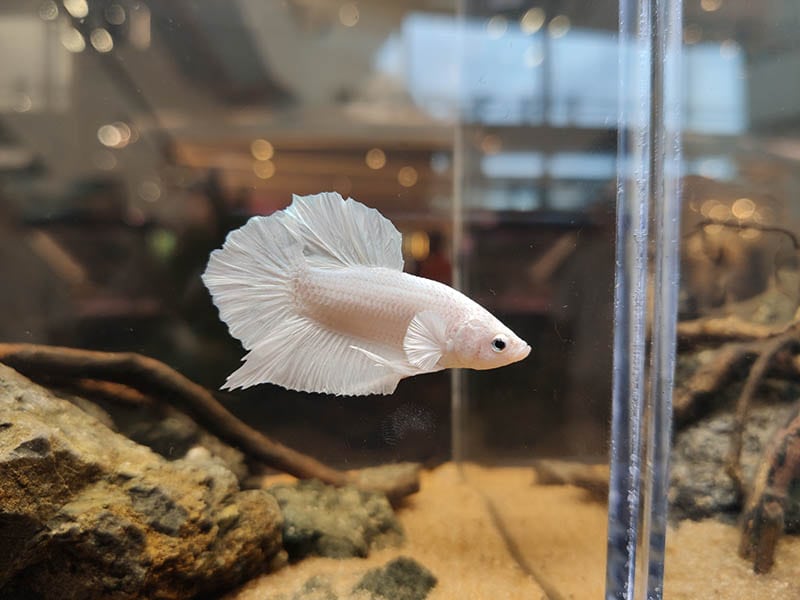
Whether it’s your newly acquired betta fish or another fish in your tank, you’re probably more than a little concerned when you see them swimming right up against the glass of your aquarium.
While this habit isn’t just unique to betta fish, it’s common enough among them for the problem to be called “betta fish glass surfing.” When you see your betta constantly swimming across the glass, it can signify that something is wrong.
If you’re wondering exactly what betta fish glass surfing is, what causes it, and what you can do about it, you’ve come to the right place. In this guide, we’ll tell you everything you need to know about betta fish glass surfing to put your mind at ease.
What Is Glass Surfing?
To understand why your betta fish might be glass surfing, you should first know what it is. Glass surfing is pretty much what it sounds like. It’s erratic behavior in your fish that makes them constantly pace up and down the glass in an aquarium.
There are more than a few causes for this behavior, and if you notice your fish doing it constantly, then something may be wrong. In other words, if you notice your betta fish pacing the glass constantly, then you need to figure out what the problem is as soon as possible.
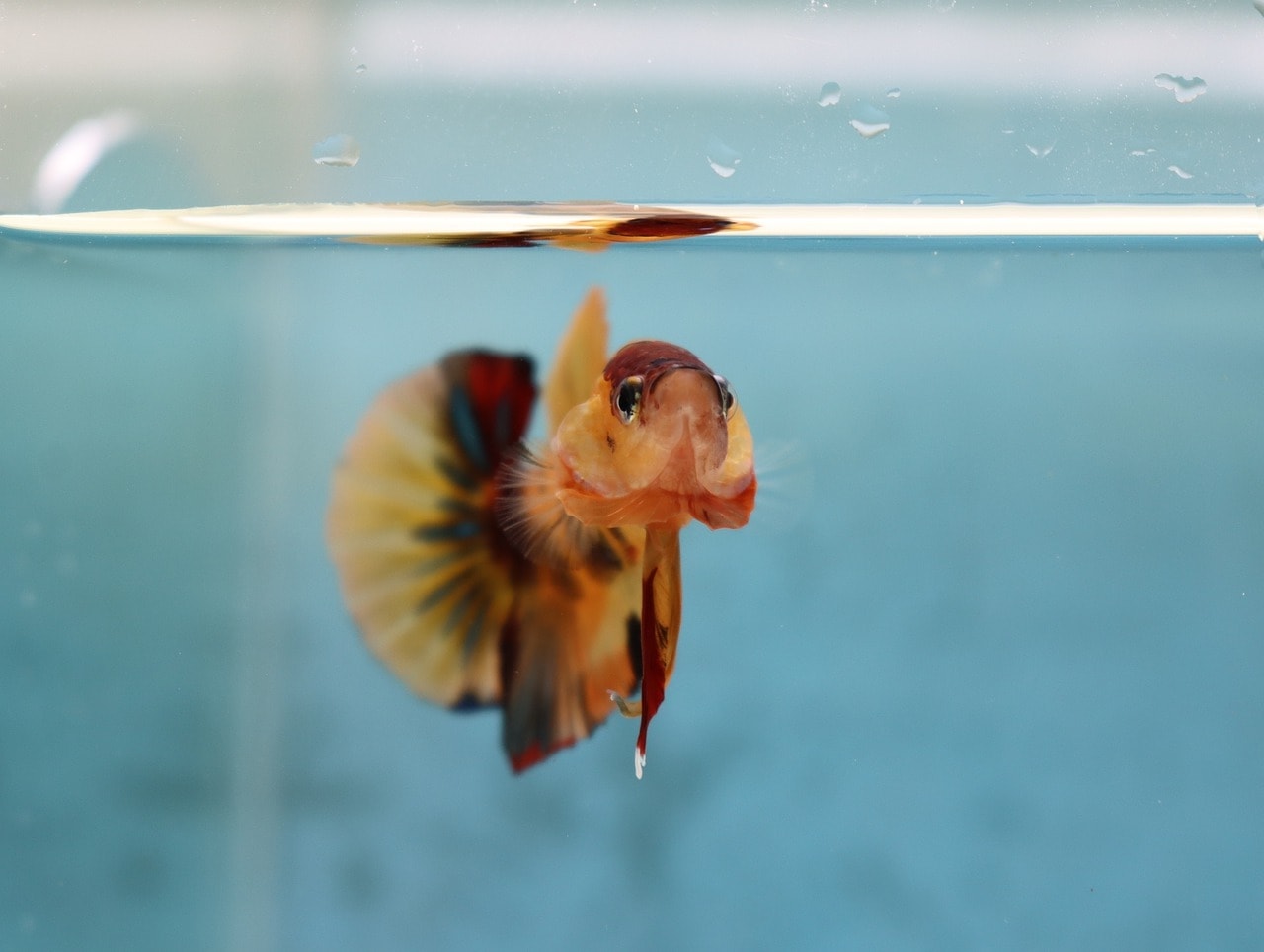
The 8 Tips to Fix Betta Fish Glass Surfing
1. Poor Water Conditions
One of the number one reasons for glass surfing is poor water conditions inside the aquarium. Water conditions and water temperature are important for betta fish, and most fish in general. While your betta can stand temperatures between 76–85 °F (24–29.5 °C), the ideal temperature for them to thrive and be comfortable is 82 °F (28°C).
If your betta is acting erratically and glass-surfing the tank, the first thing you want to do is check the temperature of the water.
Glass surfing can also be caused by poor tank maintenance. An unclean tank can lead to high levels of ammonia, which can not only make your betta erratically glass surf but can also make them ill. Even if you’re keeping your tank clean, overcrowding and overfeeding your fish can lead to poor tank conditions as well.
Preventing Poor Water Conditions
There are quite a few different ways that you can prevent poor water conditions in your tank. We’ll go into a few of them below.
Maintain Your Tank
While this might seem like a no-brainer, it’s not always done often enough by fish keepers. If you maintain your tank and clean it regularly, then your water conditions won’t have a chance to deteriorate, to begin with. You should always keep on top of the ammonia levels in your water because if they’re too high, the result can be ammonia poisoning for your betta. Like all other pet fish, bettas are also prone to nitrite and eventual nitrate poisoning.
Make Sure the Tank Is Well-Heated
Next, you want to make sure that your tank is well-heated, but not too hot. As previously stated, the ideal temperature for betta fish is 82 °F (28°C). Therefore, it’s essential to keep a reliable heater in your tank. However, if the tank tends to get hot during the summer months, you should invest in a cooling fan or chiller for your tank as well.
Don’t Overstock Your Tank
While it may be tempting to stock your tank with all the pretty fish, overcrowding can lead to a dirty tank and a whole lot of problems. If you want to have a lot of fish, then you might be better off having more than one tank, or a tank large enough to comfortably house them.
Don’t Overfeed Your Fish
Excess food left in a tank rots and gives rise to unwanted algae bloom and ammonia spikes.
2. Your Betta Sees Their Own Reflection
Note: This applies mostly to male bettas only.
Another common cause of glass surfing is that the betta sees his reflection looking back at him in the glass. The problem with seeing his own reflection is that bettas are extremely territorial, which means he wants to fight what he sees.
If you notice your betta is pacing the glass and flaring up as if he’s ready to fight, then this may be the problem.
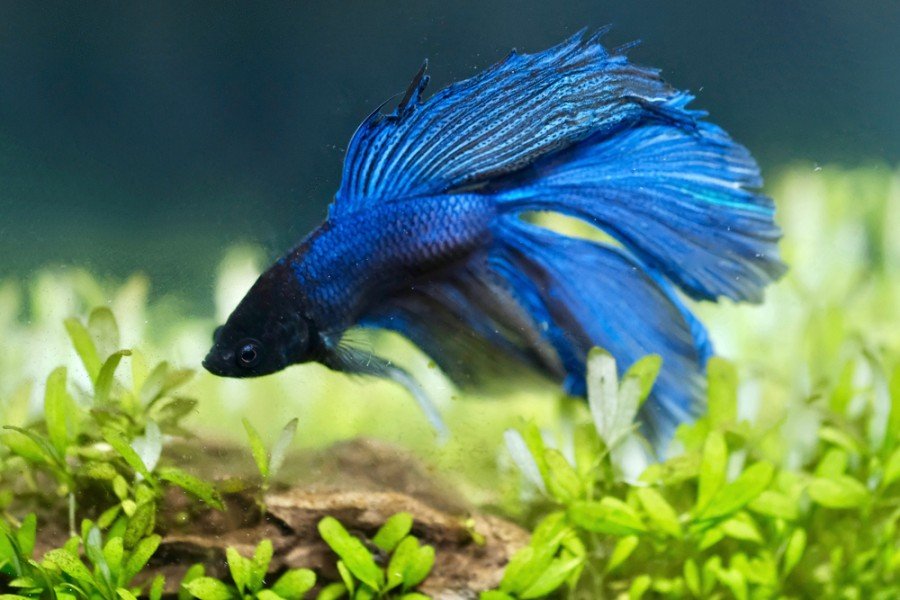
Preventing Reflections
There are a couple of things you can do to prevent your betta from seeing his own reflection:
Dim the Lights
While you don’t have to turn the lights off in the tank altogether, dimming the tank lights can stop him from seeing his reflection. The tank doesn’t have to be completely dark, just darker than the room in front of it.
Add More Plants
Adding more plants to the tank can keep your betta from seeing his reflection. If you’re not into live plants, then silk plants will work too. You want to avoid putting plastic plants in the tank, however, as they can damage your fish’s fins.
Use a Backdrop
While adding plants is an option that works, using a backdrop in the tank works even better. The backdrop will help to block the betta from seeing his reflection.
3. Wrong Tank Size
The correct size tank for bettas might be a lot larger than people think. If your tank is under 5 gallons, especially if you have more than one fish, then your betta is going to get bored. They’re also not going to have enough space to swim around, and that’s never a good thing.
Prevention: Buy a Bigger Tank
If your tank is too small for your fish, the only way to prevent your betta from glass surfing is by buying a larger tank. The tank you purchase should be 5 gallons or over for the best results. In fact, it’s much easier to take care of and maintain a larger tank.
4. Wrong Tank Mates
While many beginning fish keepers don’t realize it, not every species of fish is compatible with other species. Your betta fish will have a few tank mates they can live with. In fact, some bettas are so territorial that they can never be housed with other fish.
However, there are some fish that are aggressive, not territorial. These fish tend to attack almost any other tank mate. On the other hand, a territorial fish only shows aggression if they think another tank mate is a threat to their territory.
In a community, the biggest concern is that a betta is not a fast or strong swimmer. So, if you have a fish in your tank that is faster and more aggressive and likes to nip your betta’s fins, it could cause your betta to be stressed and start glass surfing.
Prevention: Be Careful of the Tank Mates You Purchase
This common problem can be prevented before it happens, just by making sure the fish you add to your tank don’t agitate your betta.
Research which fish are the best tank mates for bettas, then purchase one of them. After a period of quarantine, add the fish to the tank, then keep an eye out to see how the two get along.
It’s also best to add a betta as the last fish to a community tank. This way, they tend to think the fish in the tank are just residents of a brand-new territory. If your betta is kept alone in a tank for some time, they may assume any newcomers are “intruders” and might take offense to their presence.
5. Not Enough Decorations in the Tank
Is your tank looking bare? Do you have very few decorations? If so, then that could be your problem. Bettas are highly intelligent fish, so if you don’t have enough decorations in your tank, your fish is going to quickly become bored.
If your fish doesn’t have plants to swim through and places where it can hide, then they might end up glass surfing in boredom and because they’re stressed.

Prevention: Add More Decorations to the Tank
Prevention for this is easy. Just add more decorations to the tank. Cave features, decorations, and live plants are just the beginning of what you can add to the tank once you get started.
6. Your Betta Is in a New Home
If your betta is getting used to being in a new home, then it’s pretty common for them to glass surf. Whether it’s moving to a new tank or moving from one country to another, new homes are stressful for bettas, just as they are for humans.
Though this tends to resolve on its own, stress medicine and calmers can be used to help your betta if you feel as if they are too agitated.
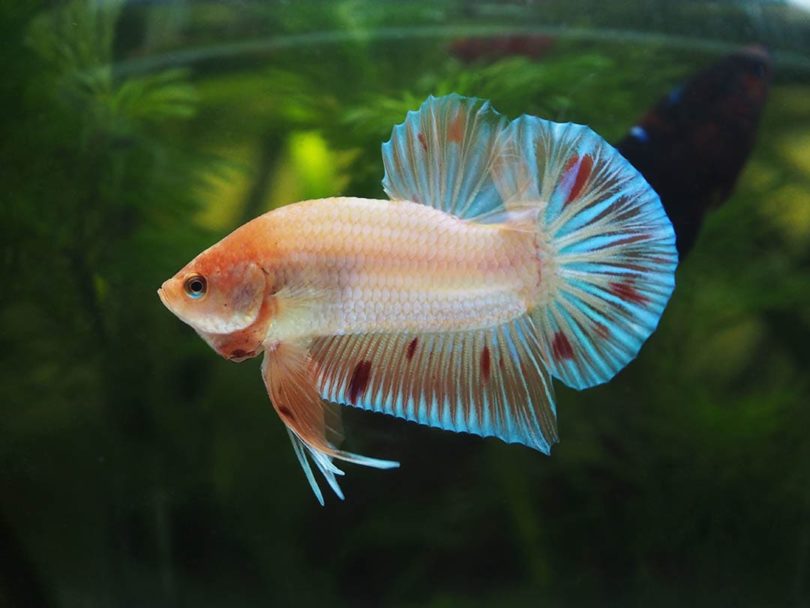
Is Glass Surfing Normal?
Honestly, seeing your betta fish glass surfing on occasion is perfectly normal, such as when they’re in a new home. However, it’s important to note that changes in their tank can cause them to glass surf for a little bit of time as well. Changes such as changing the water, putting in new decorations, adding tank mates, and even people watching your fish through the glass can cause glass surfing.
Can Glass Surfing Be Harmful to Your Betta?
Betta fish glass surfing isn’t fatal to your betta itself. However, some of the causes of glass surfing can be. If you allow your betta to continue being stressed, then it can make them more likely to become ill. If the tank is unclean, then your betta is certainly going to be more susceptible to diseases.
The one thing you should not do is ignore your betta fish’s glass surfing. If you notice your betta glass surfing, then it’s best to start checking the causes above and doing what you can to prevent them.
Final Thoughts
While betta fish aren’t the only fish that glass surf, they are one of the species that do so most often. If your betta is glass surfing, check the reasons above, and do everything you can to get their tank in the shape it needs to be for your fish to be as happy, healthy, and comfortable as they can be. You’ll be happy that you did, and so will your betta!
Related Read:
- Stressed Betta Fish (Causes, Symptoms & Treatments)
- Betta Flaring: Vet-Approved Pros, Cons & Behavior Explanation
Featured image Credit: Chanutdharm, Shutterstock




